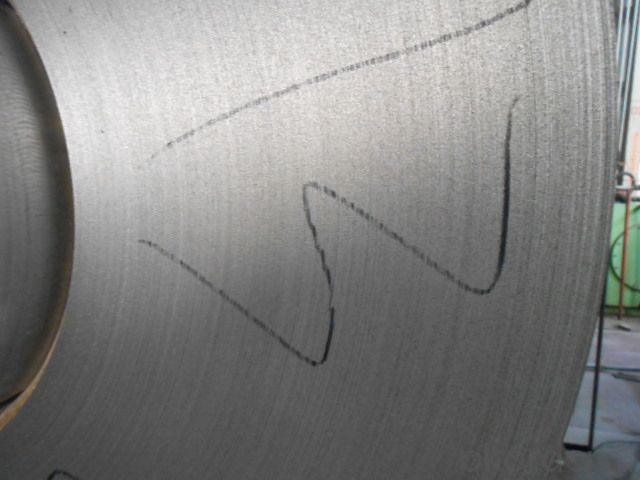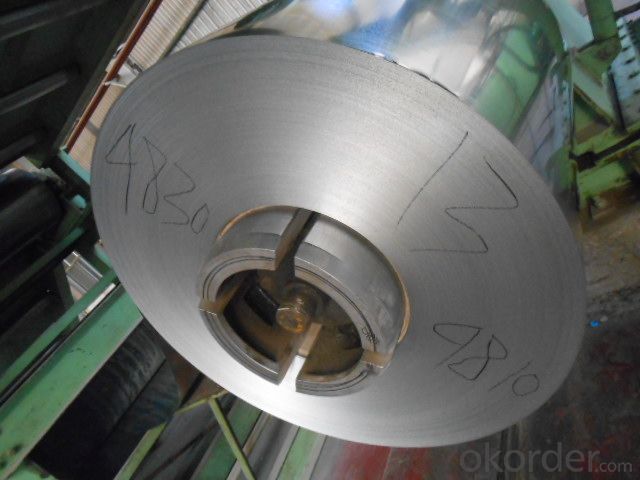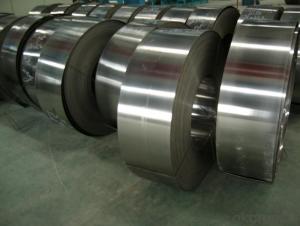Cold Rolled Steel Coil with Prime Quality many sizes and Lowest price
- Loading Port:
- Shanghai
- Payment Terms:
- TT OR LC
- Min Order Qty:
- 100 m.t.
- Supply Capability:
- 10000 m.t./month
OKorder Service Pledge
OKorder Financial Service
You Might Also Like
1.Structure of Cold Rolled Steel Description:
The raw material of cold rolled steel coil/sheet is product, and after pickling continuous rolling,.
high quality hot rolled
2.Main Features of the Cold Rolled Steel:
• W
orkability, durability
• High strength
• Good formability
• Good visual effect
5.FAQ of Cold Rolled Steel
We have organized several common questions for our clients,may help you sincerely:
1.How about your company?
A world class manufacturer & supplier of castings forging in carbon steel and alloy steel,
3. How long can we receive the product after purchase?
Usually within thirty working days after receiving buyer’
3.Cold Rolled Steel Images


Usually within thirty working days after receiving buyer’
4.Cold Rolled Steel Specification
Standard:AISI,ASTM,DIN,GB,JIS,JIS G3302 ASTM 653M EN10142
Thickness: 0.16mm~1.5mm,0.16-1.5mm Width: 1250,600-1250mm Coil weight:3-12 MT
Grade: Q195~Q345
Coil ID:508/610mm
- Q:How are steel coils used in the production of shipbuilding materials?
- Steel coils are used in the production of shipbuilding materials as they provide a convenient and efficient way to transport and store large quantities of steel. These coils are uncoiled and cut into desired sizes to construct various components of ships, such as hulls, decks, and superstructures. The versatility and strength of steel make it an ideal material for shipbuilding, and the use of coils ensures a reliable supply chain for this crucial industry.
- Q:How are steel coils used in the manufacturing of industrial filters?
- Steel coils are used in the manufacturing of industrial filters as a primary material for constructing the filter frames and support structures. The coils are typically cut, shaped, and welded to create the necessary framework that holds the filter media and allows for efficient filtration. The strength and durability of steel make it an ideal choice for withstanding the pressure and demands of industrial filtration processes.
- Q:How are steel coils inspected for surface cleanliness during processing?
- Steel coils are inspected for surface cleanliness during processing through various methods such as visual inspection, magnetic particle inspection, and ultrasonic testing. These methods help identify any contaminants, defects, or surface irregularities that may affect the quality of the steel coils.
- Q:Please explain why steel is denser than wood.
- Steel is basically a mixture (not the compound) of iron and carbon. Iron, by itself is an element and so is carbon. The atoms of Iron are larger in size compared to carbon. All the atoms of all the elements, smaller or larger, are spherical. If naturally a solid, the atoms of all such elements have voids as their atoms are closely packed. You can imagine a basket of oranges; you could see that void or empty space (which I am speaking about) between four or more of the oranges put together. Now, when heated to more than about 1500 degrees celcius, Iron melts and atoms in molten form increase space between themselves. Raising the teperature to 1800 degree celcius, carbon is mixed with iron. At this stage it causes the spherical carbon atoms to fill in the spaces present amongst the spherical atoms of the iron. On cooling, already dense iron becomes denser because no space is left there between its atoms. This denser form of iron + carbon has become steel in which carbon is not more than 3 to 4% of the total volume. Wood is nothing but a fallen and dried tree's part. When green and alive, tree's stem and branches have pores in there texture, which are fillled with water and other biological fluids necessary for the life of the plant. When dried all the fluids, especially water gets evaporated. and the pore are empty now. The term Density, means mass divided by volume (kg / cubic meters). Iron + Carbon (the steel) so tightly packed and Iron having very high atomic weight is surely denser than wood with just carbon and a few other elements with no significant role to play in the mass calculation; particularly if their are empty pore spaces filled with air only. Imagine the mass (which common people mistakingly call the weight) in kilograms of a peice of steel with dimensions of 1 meter cube and imagine the same for the dried wood. What do you think---which one is denser?
- Q:How are steel coils protected during storage and transportation?
- Steel coils are protected during storage and transportation through various measures. Firstly, they are typically wrapped with a layer of protective material such as plastic or paper to shield them from moisture, dust, and other contaminants. Additionally, steel coils are often stored in a controlled environment, such as a warehouse, to prevent exposure to extreme temperatures and weather conditions. During transportation, they are secured using specialized equipment such as steel coil racks, which prevent movement and minimize the risk of damage. These protective measures ensure the integrity and quality of steel coils throughout their storage and transportation processes.
- Q:How do steel coils contribute to durability and longevity in products?
- The durability and longevity of products are greatly enhanced by steel coils, mainly because of their strength, stability, and resistance to corrosion. Firstly, steel is widely known for its exceptional strength, making it the perfect material for applications where durability is crucial. Steel coils, which are essentially tightly rolled steel, add strength and structural integrity to products. The stability offered by steel coils is another important factor in improving product durability. The tightly rolled structure of the coils ensures that they maintain their shape and resist deformation even under heavy loads or extreme conditions. This stability is particularly significant in industries like construction and automotive, where products need to withstand rigorous usage for long periods of time. Furthermore, steel coils have excellent resistance to corrosion, primarily due to the presence of protective coatings. These coatings, such as zinc or other metallic alloys, act as a barrier against moisture and environmental elements that cause rust and degradation. By preventing corrosion, steel coils help extend the lifespan of products, making them more durable and reliable. Moreover, steel coils can be customized to meet specific requirements, such as different thicknesses, widths, or surface finishes. This versatility allows manufacturers to tailor the steel coils to their desired application, ensuring optimal performance and longevity in their products. To sum up, steel coils contribute to the durability and longevity of products through their strength, stability, corrosion resistance, and customization capabilities. By incorporating steel coils into various industries and applications, manufacturers can ensure that their products last longer and provide greater reliability to consumers.
- Q:many sword sellers sell swords made of 440 and stainless, i know those are both totally **** for real swords. so are 1045, 1060, or 1095 good grades of steel for a sword?
- You'll okorder has a great introductory articles on metallurgy as it pertains to swords. Check 'em out.
- Q:How are steel coils affected by global trade policies?
- Steel coils are significantly affected by global trade policies as they are subject to various tariffs, quotas, and trade restrictions imposed by different countries. These policies can impact the cost, availability, and competitiveness of steel coils in the international market. Changes in trade policies can lead to fluctuations in demand and supply, impacting the prices and trade volumes of steel coils.
- Q:How are steel coils used in the manufacturing of tools and equipment?
- Steel coils are used in the manufacturing of tools and equipment as they are typically shaped and cut into various components such as blades, springs, and handles. These coils provide the necessary strength and durability required for the tools and equipment to withstand heavy usage and perform effectively.
- Q:I am wondering if i can use my western guitar as a kind of steel-guitar, read something about it on Wikipedia.
- Musical style speaks volumes while it includes this concern. people who % severe quantity would be unhappy with unamplified nylon string guitars. From my attitude, the common distinction between metallic and nylon is this: metallic strings ring and nylon strings resonate. the quantity produced by employing metallic is frequently plenty greater suitable than nylon yet, to my way of thinking, the sound resonance produced by employing the wood of your guitar is largely masked by employing metallic strings. in case you have a decently made guitar (frequently, around 1000 money and up), the sound interaction between the wood and the strings in a nylon guitar is magical around the completed frequency selection. With a metallic string guitar, the sound produced by employing the vibrating string overpowers the wood resonance in any respect yet low frequencies. in my view, i will take a nylon string guitar any day for the sensitivity gained from the interaction between wood and vibrating string.
1. Manufacturer Overview |
|
|---|---|
| Location | |
| Year Established | |
| Annual Output Value | |
| Main Markets | |
| Company Certifications | |
2. Manufacturer Certificates |
|
|---|---|
| a) Certification Name | |
| Range | |
| Reference | |
| Validity Period | |
3. Manufacturer Capability |
|
|---|---|
| a)Trade Capacity | |
| Nearest Port | |
| Export Percentage | |
| No.of Employees in Trade Department | |
| Language Spoken: | |
| b)Factory Information | |
| Factory Size: | |
| No. of Production Lines | |
| Contract Manufacturing | |
| Product Price Range | |
Send your message to us
Cold Rolled Steel Coil with Prime Quality many sizes and Lowest price
- Loading Port:
- Shanghai
- Payment Terms:
- TT OR LC
- Min Order Qty:
- 100 m.t.
- Supply Capability:
- 10000 m.t./month
OKorder Service Pledge
OKorder Financial Service
Similar products
New products
Hot products
Related keywords





























